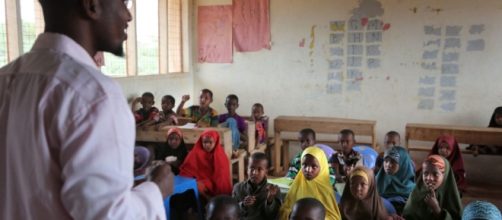The importance of Emergency Education: - For hundreds of thousands of children in African countries, the refugee camp is their one opportunity to get an education. Many of these children have been the victims of violent conflicts resulting in their separation from parents, friends and family. They have lost the security they once had and for some, they have never known what it is to feel secure. Emergency education in refugee camps allows children to regain some sense of security and to feel that in some way, they have something worth living for.
Emergency education contributes to the physical and emotional development of displaced children while giving them a sense of belongs to a community through social interaction.
A right to education
Emergency education is practiced in areas where children have no access to traditional education systems as a result of wars, civil wars, natural disasters and other such emergencies. Many Human Rights Declaration and conventions address a child's right to education. The 1951 Convention Relating to the Status of Refugees, guarantees the right to elementary education. UN agencies like UNICEF, UNHCR and UNESCO. UNHCR are charged with implementing these conventions.
The program
In Mogadishu, Kenya, Djibouti, Yemen and Ethiopia, Rwandan, Somalia and Somaliland, emergency refugee programs are in place thanks to The Programme for Education in Emergencies and Reconstruction (PEER)under the UNESCO umbrella.
PEER has developed the Teacher Emergency Package (TEP) which contributes significantly to emergency education in these regions. The focus of TEP is on numeracy and literacy with the intention of creating a bridge between no schooling and the start of some form of schooling. Emergency education practices also provide the opportunity for displaced teachers to resume their teaching activity, albeit in refugee camps in Africa.
Not all African refugee camps follow the TEP program. There is one report that Burundian refugee camps, instead of applying the transitional approach, went directly for the formal school education program. In other African refugee camps, there has been conflict between the agencies providing the education and the government of the host country.
At one point, the Tanzanian government even banned any schooling in refugee camps which led agencies like the NGO, to create "activity centers" in Burundian refugee camps. These were essentially, schools under cover.
Order in the midst of chaos
Emergency education in African Refugee camps is challenging work. The need for some semblance of order in chaotic times is undeniable. Refugees are traumatized, confused and in a state of deep despair as they try to make sense of the disasters that surround them. Humanitarian organizations play a central role during times like these by offering assistance to the cold, weary, hungry and panicked. Emergency education is one form of assistance that serves to bring a sense of normalcy, hope and familial bonds to the refugee camps.

